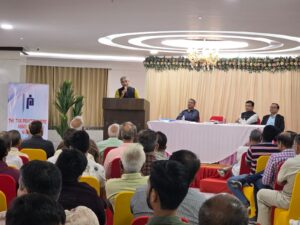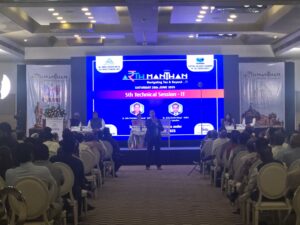GST WEEKLY UPDATE : 29/2023-24 (DATED : 16.10.2023) By CA Vipul Khandhar

By Vipul Khnadhar
- Facility for the e- commerce operators through whom unregistered suppliers of goods can supply goods:
GSTN has also provided APIs for ECOs (through whom unregistered persons can supply goods) to integrate with GSTN to obtain the details and facilitate the unregistered suppliers. The APIs are for validating the demographic details of the said suppliers and also for use in tracking and reporting supplies by such persons. The details of the APIs are as follows:-
a) The name of the APIs developed are :
- Unregistered Applicants API: To get the details of Unregistered Applicant by passing the enrolment ID in the GET request
2. Unregistered Applicants Validation API: To validate the Mobile Number and Email ID of a Enrolment ID
b) The following is noteworthy for the e-Commerce operators in order to access and integrate the APIs successfully:
- The e-Commerce operator should contact any GSP to access the above APIs as the APIs are not publically available.
2. To access these APIs Authentication Token should be obtained from the authentication API, the API specs are available at developer portal
(https://developer.gst.gov.in/apiportal/) under Public API à Authentication.
3. For accessing the public APIs the authentication token should be obtained by using the GSPs credentials.
4. The APIs specs for the two eComm APIs are available on developer portal (https://developer.gst.gov.in/apiportal/)under Public API eComm operators.
5. he response of both APIs will be Base64 encoded, no encryption is used.
2. Facility of enrolment for supply of goods through e-commerce operators by GST un-registered suppliers:
- In terms of the recent amendments to the Act and the rules and notification number 34/2023 dated 31.07.2023, persons supplying goods through e-commerce operators shall be exempt from mandatory registration under the CGST Act even if they supply goods through e-commerce operators (ECO) if they satisfy the following conditions:
(a)such person is engaged in the supply of goods through the ECO and such supplies are made only in one State/UT,
(b)such person does not make any inter-state supply,
(c)the said person has a Permanent Account Number (PAN) under the Income Tax Act, 1961,
(d)such persons shall declare his PAN (which shall be validated) on the common portal (i.e. GST Portal) along with the address of his place of business and the name of the State/UT or Union territory before making such supplies
(e)such person has been granted an enrolment number on the common portal upon validation of his PAN before which he shall not make any such supply through any ECO.
- GSTN has developed the necessary functionality for enrolment of unregistered persons and the same is available on the portal. Accordingly, unregistered person desirous of enrolling on the GST portal for making supplies of goods through ECOs in any one State/UT are hereby advised to follow the path/procedure specified below:
- Visit the GST Portal at https://www.gst.gov.in/ and click the GST Portal link
- Select the “User Services” Tab and choose “Generate User Id for Unregistered Applicant”
- Click “Yes” on the Warning window which asks you to Continue
- Check the “To apply as a supplier to e commerce operators” box
- Proceed to fill the Form that opens on your screen
- Upon successful validation of your PAN the enrolment number will be generated by the portal.
3. Gangajal Exempt From GST:
Gangajal is used in pooja by households across the country and puja samagri is exempt under GST. GST on puja samagri was discussed in detail in the 14th and 15th meetings of the GST Council held on 18/19 May 2017 and 3rd Jun 2017 respectively and decided to keep them in the exempt list. Therefore, all these items have been exempt since the introduction of GST.
4. GSTN Advisory on DRC-01C Compliance for ITC Discrepancies:
- Goods and Services Tax Network GSTN Advisory in respect of introduction of Compliance Pertaining to DRC-01C (Difference in Input Tax Credit (ITC) available in GSTR-2B & ITC claimed in the GSTR-3B) Dated: 06/10/2023
- The GSTN has issued Advisory No. 606 dated October 06, 2023in respect of the introduction of Compliance Pertaining to DRC-01C (Difference in Input Tax Credit (ITC) available in GSTR-2B & ITC claimed in the GSTR-3B).
- The Government vide Notification No. 38/2023 – Central Tax dated August 04, 2023 inserted the Rule 88D in CGST Rule, 2017 dealing with difference in input tax credit available in GSTR-2B and ITC availed in GSTR-3B. This functionality vis a vis this rule has now started operating on the GST portal.
- The system nowcompares the ITC available as per GSTR-2B/2BQ with the ITC claimed as per GSTR-3B/3BQ for each return period. If the claimed ITC exceeds the ITC available as per GSTR-2B by predefined limits, as directed by competent authority, the taxpayer shall receive an intimation in the form of Form DRC-01C.
- Upon receiving theintimation, the taxpayer must file a response using Form DRC-01C Part B. The taxpayer has the option to either provide details of the payment made to settle the difference using Form DRC-03 or provide an explanation for the difference out of the options provided in the form or even choose a combination of both options and file it.
- In case, no response is filed by the impacted taxpayers in Form DRC-01C Part B, such taxpayers will not be able to file their subsequent period GSTR-1/IFF.
5. AAR & Important Judgements:
(i) AAR On GST Exemption On Printing Question Paper For Educational Institutions:
(Applicant – Saraswaty Press Limited)
- Background of the Case: Saraswaty Press Limited, a company involved in the printing business, including the printing of question papers for various educational institutions, found itself at the heart of a taxation dilemma. The key factor was the demand for confidentiality, accuracy, and timely delivery of these question papers, primarily used by government-based educational institutions.
Questions Raised by the Applicant: The applicant had three key questions: a. Whether printing question papers for educational institutions would be treated as an exempt supply under GST. b. Could the GST charged on previous invoices for these services be refunded? c. Was the applicant eligible for a refund of GST collected on previous invoices, while following the principle of unjust enrichment as per sections 54(5) and 54(8) of the GST Act?
Scope of the Advance Ruling: The AAR clarified that it could provide an advance ruling only on the question related to the exemption from GST on printing question papers (as covered by clause e of sub-section 2 of section 97 of the GST Act). The questions related to GST refunds were deemed outside the scope of advance rulings.
Exemption Under GST: The crux of the case revolved around the applicability of the exemption. The applicant’s client, Jharkhand University of Technology, believed that the services provided by Saraswaty Press for printing question papers were exempt from GST. The exemption in question could be found in serial number 66 of Notification No. 12/2017-Central Tax (Rate), as amended. This notification stated that services provided to educational institutions for the printing of question papers for conducting examinations were exempt from GST.
Clarifications from Circulars: The case involved reliance on Circular No. 151/07/2021-GST issued by the Tax Research Unit, Department of Revenue, Ministry of Finance, Government of India. The circular clarified that input services, such as printing of question papers and admit cards, for universities conducting examinations, were not subject to GST. It also emphasized that the universities were not required to pay GST on such services. As a result, the applicant was requested not to charge GST on future invoices for these services.
Definition of Principal Supply: The applicant argued that in cases where the usage rights of manuscript material belonged to educational institutions and physical inputs were provided by the printing company (Saraswaty Press), the principal supply was the service of printing. According to their interpretation, the supply of printing represented the primary component and, therefore, qualified as a service under heading 9989 of the GST classification.
Exemption for Educational Institutions: The critical provision for this case was found in Sr. No. 66(b)(iv) of Notification No. 12/2017-Central Tax (Rate). It exempted services provided to educational institutions for printing question papers used in conducting examinations.
Educational Institution Definition: The definition of educational institutions was crucial for the case. It encompassed institutions offering services like pre-school education, education up to higher secondary school or equivalent, education as part of a curriculum for obtaining a recognized qualification, and education as part of an approved vocational education course. Jharkhand University of Technology fell under the umbrella of this definition, as indicated in Circular No. 151/07/2021-GST.
Conclusion of the Ruling: Based on the above analysis, the AAR ruled that the services provided by the applicant (Saraswaty Press Limited) for printing question papers used in conducting examinations for educational institutions would be covered by Sl. No. 66 of Notification No. 12/2017-Central Tax (Rate), as amended. Consequently, these services shall be treated as exempt supplies under GST. The advance ruling from the GST AAR in West Bengal clarifies the tax treatment of printing services for question papers used in educational institutions. This case emphasizes the importance of understanding the specific exemptions and definitions outlined in GST notifications and circulars, providing guidance on when services can be considered exempt from GST.
Disclaimer:
This publication contains information for general guidance only. It is not intended to address the circumstances of any particular individual or entity. Although the best of endeavour has been made to provide the provisions in a simpler and accurate form, there is no substitute to detailed research with regard to the specific situation of a particular individual or entity. We do not accept any responsibility for loss incurred by any person for acting or refraining to act as a result of any matter in this publication.
THANKING YOU.




